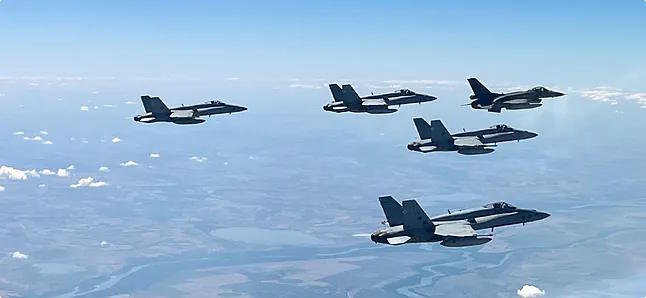A total of 44 airmen from the Spanish Air and Space Force are in Iceland to prepare for the defense mission of NATO's Northern border in which Spain will participate. This initial team forms an 'advance party' that will finalize the conditions for the national Armed Forces to defend this territory of the Allies for the first time. While the government had previously focused on the Eastern front, they now aim to demonstrate commitment and seriousness in the North as a partner.
As explained in a statement by the Defense Staff, "for the first time in its history, the Spanish Air and Space Force (EA) will deploy a detachment of F-18 fighter jets in Iceland, named 'Stinga' (sting in Icelandic)". The mission is part of NATO's air policing, in which Spain already participates in the Baltics to monitor the entry of Russian aircraft into the alliance's airspace.
In Iceland, the EA will be deployed for about a month. The initial 44 military personnel will be joined by up to 122 personnel — including pilots, mechanics, armament specialists, logistics, security, and other support services necessary to carry out this mission — who will be deployed at Keflavik Air Base in southern Iceland. The arrival of the six F18 fighters is scheduled for tomorrow, July 22, and after a few days of preparation, they will integrate into NATO's command structure on the 28th, marking the start of an operation that will last until mid-August.
Lieutenant Colonel Rafael Ichasco Franco will lead the operation, acknowledging that while the protocol is similar to other air policing missions, they have had to "compensate for the lack of experience in this environment with many hours of simulator training to prepare especially for the possible missions that can be carried out here."
This mission is part of those decided by NATO to deploy in 2014 following Russia's illegitimate annexation of Crimea. In this context, the main mission of the 'Stinga' DET is to monitor and intercept aircraft operating without a flight plan, without radio contact or with the transponder deactivated, to ensure the safety of allied airspace. To achieve this, the Spanish detachment will remain on permanent quick reaction alert (QRA).
Furthermore, during this deployment, scheduled training flights in the area will be crucial to maintain and improve the capabilities of the pilots and crews, as well as the operational readiness of the F18 fighters. Iceland, a NATO member without its own air force, receives rotating allied detachments responsible for protecting its airspace. Like the 'Stinga' DET, all NATO contingents deploy at Keflavik Base, a strategic installation in the North Atlantic, crucial for controlling intercontinental air routes.
